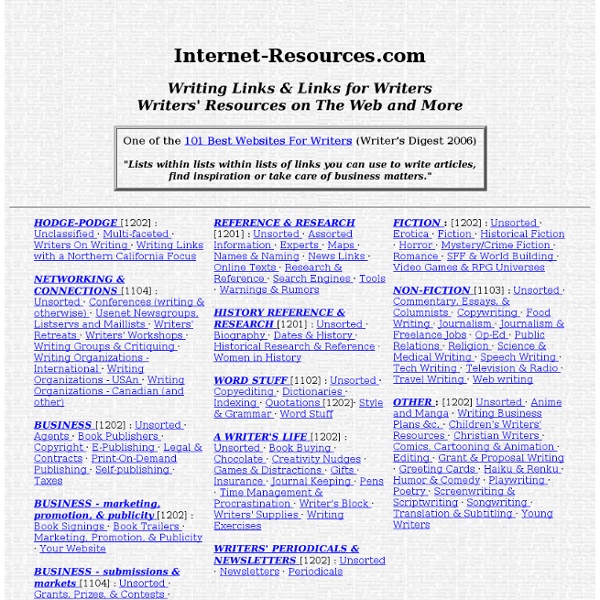WritersResources.com - an online resource site for both aspiring and professional writers
Online Etymology Dictionary
How to Create Good Personalities for Your Characters
Edit Article Sample Character DescriptionsCreating Personalities for Your Own Characters Edited by Secretive, Julia Maureen, Flickety, Ben Rubenstein and 19 others You're on a plane to a distant country to visit some weird old relatives you are somehow related to. In your hands, you hold a book that your friend recommended. But wait...as you begin to read you realize that the characters are really boring! Ad Steps Sample Character Descriptions Creating Personalities for Your Own Characters 1Start with a simple profile including these categories: Name, Age, Gender, and Occupation. 6Continue developing characters until your story is finished. Tips Keep the characters true to themselves. Warnings Don't copy off other characters in different, already well known books, such as Harry Potter.
An Essay by Einstein -- The World As I See It
"How strange is the lot of us mortals! Each of us is here for a brief sojourn; for what purpose he knows not, though he sometimes thinks he senses it. But without deeper reflection one knows from daily life that one exists for other people -- first of all for those upon whose smiles and well-being our own happiness is wholly dependent, and then for the many, unknown to us, to whose destinies we are bound by the ties of sympathy. "I have never looked upon ease and happiness as ends in themselves -- this critical basis I call the ideal of a pigsty. "My passionate sense of social justice and social responsibility has always contrasted oddly with my pronounced lack of need for direct contact with other human beings and human communities. "My political ideal is democracy. "This topic brings me to that worst outcrop of herd life, the military system, which I abhor... "The most beautiful experience we can have is the mysterious. See also Einstein's Third Paradise, an essay by Gerald Holton
The Thirty-Six Dramatic Situations
The Thirty-Six Dramatic Situations is a descriptive list which was created by Georges Polti to categorize every dramatic situation that might occur in a story or performance. To do this Polti analyzed classical Greek texts, plus classical and contemporaneous French works. He also analyzed a handful of non-French authors. In his introduction, Polti claims to be continuing the work of Carlo Gozzi, who also identified 36 situations. Publication history[edit] “Gozzi maintained that there can be but thirty-six tragic situations. This list was published in a book of the same name, which contains extended explanations and examples. The list is popularized as an aid for writers, but it is also used by dramatists, storytellers and many others. The 36 situations[edit] Each situation is stated, then followed by the necessary elements for each situation and a brief description. See also[edit] References[edit] External links[edit]
Lectures - DanielTammet.NET
Past schedule Daniel Tammet is represented by the JLA Agency (UK/Europe) and the David Lavin Agency (North America). He has spoken at a number of events, including: Idea Festival, Louisville, Kentucky, October 2010 TED, 'Different Ways of Knowing', Long Beach, California, March 2011 International School of Geneva, October 2011 Ciudad de la Ideas Festival, Mexico, November 2011 IBM Smarter Analytics, Paris, June 2012 Edinburgh Book Festival, August 2012 TEDxParis, Paris, October 2012 The Royal Society of Arts, London, November 2012 Agnes Scott College, Decatur Georgia October 2007 Shippensburg University President’s Lecture Series, Pennsylvania, October 2007 Mount Sinai School of Medicine, New York, October 2007 Lorain County Community College, Meeting Great Minds, Elyria Ohio, October 2007 Adrian College, Michigan, October 2007 Ways With Words Literary Festival, Dartington, Cornwall, July 2006 Edinburgh Book Festival, August 2006
Tension
Hook Your Readers With Tension By Laura Backes, Write4Kids.com Tension. Without it, life would be—let's face it—boring. So would fiction. Tension works with conflict to raise the emotional level of the text to a boiling point. "Tension" is a loaded word, and can be misleading. Tension is what hooks readers of any age and keeps them turning the pages. * The ticking clock. * Dialogue. * Pacing. * Sentence structure. Each story requires a different kind of tension. Laura Backes is the author of Best Books for Kids Who (Think They) Hate to Read from Prima/Random House. Copyright © 2002, Children's Book Insider, LLC
25 Things You Should Know About Word Choice
1. A Series Of Word Choices Here’s why this matters: because both writing and storytelling comprise, at the most basic level, a series of word choices. Words are the building blocks of what we do. 2. Words are like LEGO bricks: the more we add, the more we define the reality of our playset. 3. You know that game — “Oh, you’re cold, colder, colder — oh! 4. Think of it like a different game, perhaps: you’re trying to say as much as possible with as few words as you can muster. 5. Finding the perfect word is as likely as finding a downy-soft unicorn with a pearlescent horn riding a skateboard made from the bones of your many enemies. 6. For every right word, you have an infinity of wrong ones. 7. You might use a word that either oversteps or fails to meet the idea you hope to present. 8. Remember how I said earlier that words are like LEGO, blah blah blah help define reality yadda yadda poop noise? 9. Incorrect word choice means you’re using the wrong damn word. 10. 11. 12. 13. 14. Am. 15.



